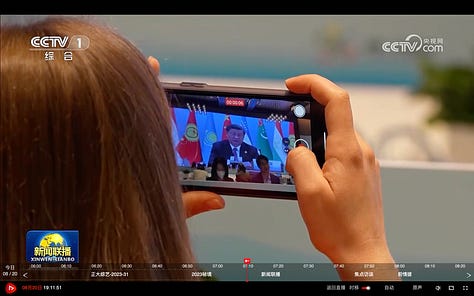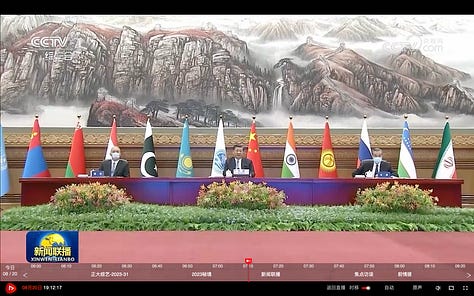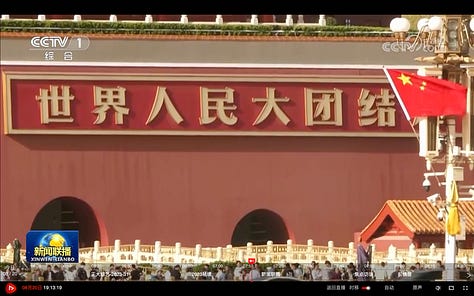Essay: Qin Gang's red banner end run (update)
China's cosmopolitan foreign minister Qin Gang has been disappeared and dismissed, but his legacy lives on. Yet CCTV unfairly gives Xi all the credit for the diplomatic choreography of the tireless FM
I’m re-upping this August 20th piece about the mysterious and still-unexplained disappearnce of (former) Foreign Minister Qin Gang. Qin Gang’s attention to protocol, ceremony and diplomatic finesse provides a vivid constrast to the slipshod and sloppy logistics of Xi’s recently-concluded visit to South Africa where organizational confusion, lapses in protocol and security scares were plainly visible on camera.
A gaping hole was left in China’s diplomacy when Qin Gang was uncermoniously taken off the political stage (eerily mirroring the literal stage removal at the October party congress of former party chief Hu Jintao, also unexplained to this day
.)
CCTV’s top news story on August 20th celebrated China’s recent foreign policy achievement. It’s an odd choice in the sense that the foreign minister responsible for making it happen has disappeared into a black hole from which no news has been leaked. It’s also odd in the sense that Xi Jinping has not appeared on TV since July 31, except in re-runs, read-outs of ghost-written letters and in video gems from the vault of CCTV archives.
This sudden extravagant show of canned diplomatic footage seems an attempt to boost Xi’s stature despite his long absence from the airwaves. Whatever the reason, whether to distract from the paramount leader’s tone-deaf inaction during the recent catastrophic floods, or as a grandiose preface to his South Africa visit this week, the puff piece reeks of style over content. It’s the kind of propaganda CCTV is good at, but that’s not to say the accomplishments portrayed therein are in any way trivial; it’s been quite the year so far.
The last year proved to be a red banner year for China’s foreign policy, as busy at home as abroad, with multiple summits, state visits, and song and dance extravaganzas. The consummately-choreographed Moscow summit and the extravagant Xi’an gathering of Central Asian leaders was achieved under the guidance of the indefatigable, detail-oriented, high-flying Qin Gang who took office in January.
(editor’s note:) The former high-flying foreign minister is now grounded and thought to be in detention at an undisclosed location where he is possibly being punished for disciplinary irregularities and interrogated on paranoia-driven accusations of treason.
The CCTV segment highlighted in the screenshots below aired as the top story on the 8/20 Xinwen Lianbo evening news The program does not once mention the charming, cosmopolitan, peripatetic Qin by name, nor does it even once show his likeness or give him any credit whatsoever, and it rather artfully edits him out of it, despite his outsized role, but Qin’s fingerprints are all over every single diplomatic event depicted below.
(editor’s note:) For an excellent look at Qin Gang at work behind the scenes, please see this report by a diplomat from Belarus who worked with the perfectionist Qin to smooth out every conceivable wrinkle in Xi’s short visit to that country.
It’s a tireless, thankless job to be China’s top diplomat to be sure. The Foreign Minister is forever on call in multiple time zones, making sure every pressing matter is attended to fully in the highly-scripted and carefully choreographed world of Chinese diplomacy. Indeed, when one takes a look at diplomacy on the ground, as seen from the inside, Xi looks less the omnipotent leader than a merely competent and passive stage actor who must carefully walk through the steps, hit his marks, remember his catchphrases and mind his cues as the world’s cameras turn to him. He needs to have it all arranged in advance—no surprises and no room for spontaneity—so it’s got to be meticulously coordinated and tightly scripted. It takes an inordinate amount of work to stage a complex public relations event with so many moving parts in which everything goes exactly as planned down to the last step. It’s hard to make it happen and even harder to make it look effortless and easy.
Qin Gang was up to the job.
And it’s been a red-banner year since January when Qin Gang became foreign minister. He and his like-minded protocol people personally oversaw numerous number of red carpet receptions at the Great Hall of the People and hosted logistically complex trips abroad including the high stakes state visit to Moscow.
In Beijing, state visits are as diligently and skillfully choreographed as any opera. Every photo op upon which CCTV cameras are permitted to cast their gaze is executed with the help of security teams and police muscle. This helps politically dependable editors at the state mouthpiece to capture the drama exactly as the big boss wants it on camera, but even the home court advantage involves precision timing, extensive road closures, crowd control, security checks, the festooning of red flags, the flushing out Tiananmen Square, the setting up of flowers, memorial wreaths, mock cannons and rows of tin soldiers on the flanks of the Great Hall of the People.
Foreign nations which receive visits from China’s top leadership are likewise expected to pull out all stops, maintain unassailable security and otherwise reciprocate China’s renowned hospitality with lavish receptions of their own. This presents a ton of prep work for both sides and careful observance of protocol, again involving many sleepless nights at China’s Foreign Ministry, especially when choreographing the drama from afar.









No detail is too small, whether it is placement of tea cups on a table, deciding who sits at the head of the table (only one answer to that) or even banquet decorations and floral themes, mascots, and the many controlled outdoor shots included in the blanket TV coverage that should converge on emphasizing the blossoming of friendship between China and the world.

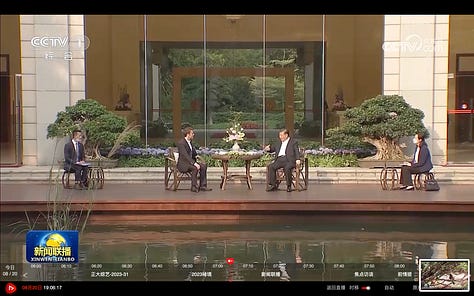

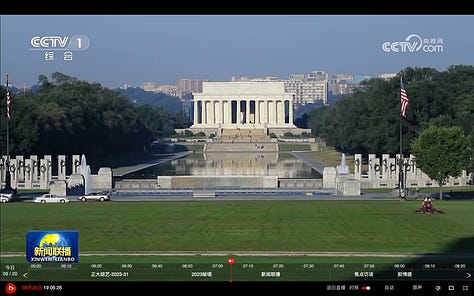



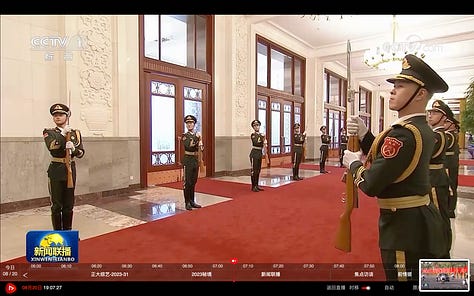

Qin Gang is no stranger to meeting world leaders as a former personal protocol aide to Xi, ambassador to the US and foreign minister. With help and perhaps some guidance from veteran foreign policy czar Wang Yi, Qin Gang oversaw arrangements for the elaborate March 2023 summit in Moscow.
A partial list of high-level visits supervised on Qin Gang’s first half year on the job and under his watch include over a dozen heads of state (Brazil, France, Belarus, Iran, Philippines, Cambodia, Turkmenistan, Kazakhstan, Kyrgyzstan, Tajikistan, Uzbekistan, Gabon, Eritrea and over a dozen high-rank officials ranging from the Russian prime minister and to foreign ministers (Australia, Singapore, Laos, Uruguay, New Zealand) US Secretary of State and the head of the European Commission.
A red banner diplomatic season by any standard during which Qin was not only indefatigable but under the pressure of rumors about an indiscreet romantic liaison.
As was later strongly hinted through several, all-too-public online posts for all the world to see, Qin’s long hours and tireless, demanding routine required that he miss a date, a very special date with someone very dear to him (Fu Xiaotian, author of the pointed posts, had just had a baby and was living in LA at the time). In an imaginary conversation with her baby son, the vivacious broadcast personality Fu tweeted on Qin’s birthday that they couldn’t celebrate his birthday because he had to go on a mission, which just happened to coincide with Qin Gang’s mission to Moscow.
And not long after that, without any vacation time in sight, Qin was under pressure to negotiate terms and rearrange the visit US Secretary of State Antony Blinken to Beijing which was postponed on his watch due to the spy balloon crisis, and reschedule it later in the spring, which required walking a political tightrope. Politics aside, though politics are never far to the side in China, the logistics alone present a major headache when the representatives of two powerful countries meet.




Qin Gang simultaneously helped his country reaffirm its friendship commitment to Russia, playing footsie with Putin while offering a tentative outstretched hand to the US, resulting in a flurry of American visitors who had to face varying degrees of protocol hell, except for Henry Kissinger, because he’s different and he always gets the red-carpet treatment despite his record of war crimes. Xi grandly sat at the head of a big table for the Blinken visit, but Kissinger got a cozy tete-a-tete in a lux villa.


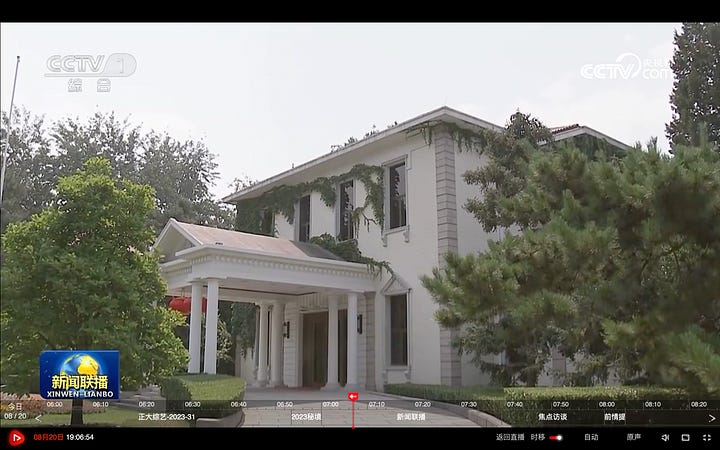

China’s attention to protocol, and it’s willingness to be petty about it, is perhaps unmatched in the world. Who appears first, who walks towards whom, who’s on the left, who’s on the right, who’s in the center? Who talks first, who gets the last word? So much work. So much sweat in the details. Airport greetings. Motorcades. 21-gun salutes. Bussing in children to act ecstatic and wave flags. Arranging the placement of foreign flags. Putting down acres of red carpet. Erecting a sun awning on the steps of the Great Hall, getting the PLA in on the act, putting them on show with crisp, precision marches and bayonet salutes.



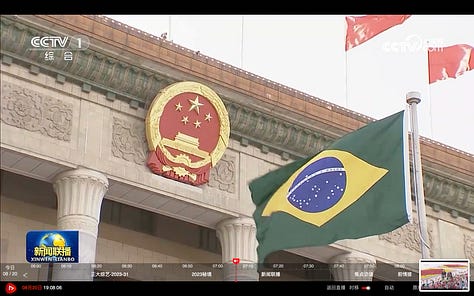
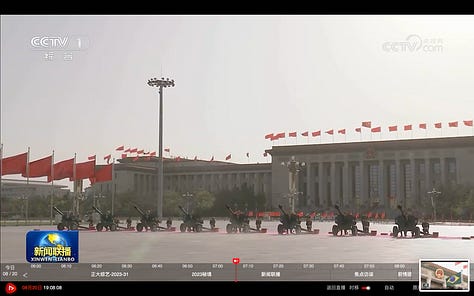
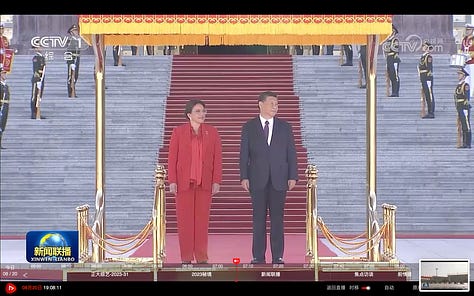
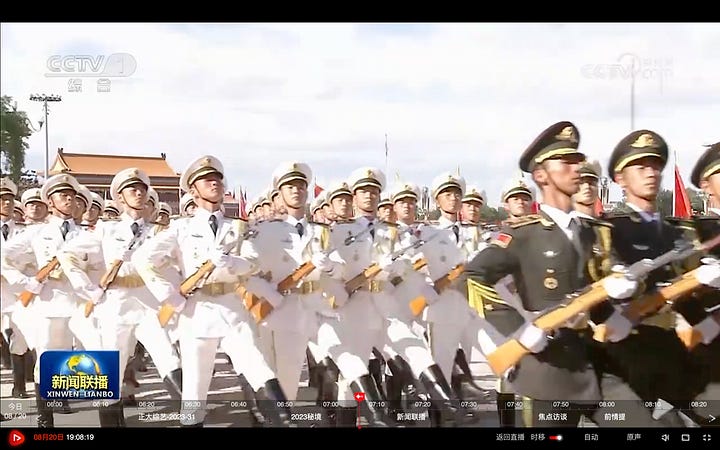
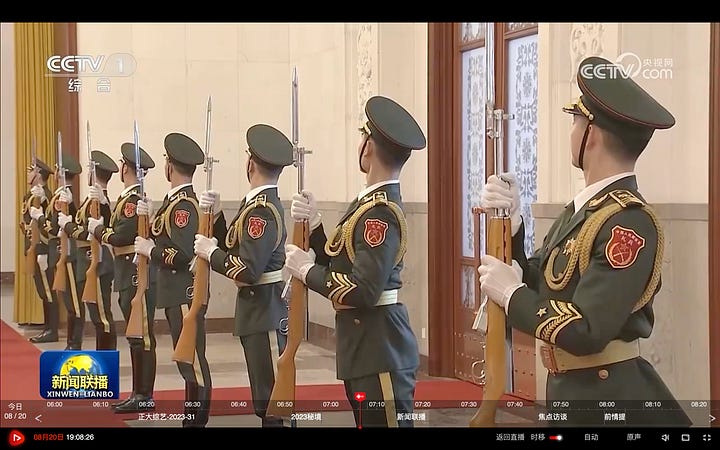
And don’t forget the virtual Zoom-style visits. Even video links require hundreds of hours of preparation, protocol, studio lighting, camera set-up, etc.
Today’s display of China’s greatest diplomatic hits of the first half of this year (corresponding exactly to Qin’s brief but accomplished tenure as top diplomat) lets China strut its stuff with a mix of solemnity, pride and effervescent hope, with lots of spring blossoms, paired birds, sunsets and lavish postcard shots. Even the much-maligned and deliberately snubbed Ukraine gets a brief cameo, because China, despite Xi’s peevish insistence on leaning to Moscow, has loftily pronounced peace talks to be the only way forward.









If politicians in Kiev and Moscow, both pictured below, would only listen to reason, or so reasons the CCP, and if only other countries would fall in line and listen to the oracular reason of China in Xi’s clarion call for human harmony and peace with Chinese characteristics, then all would be well in the world.




Qin’s exertions during his six-month tenure in power were considerable and commendable. Lots of long days and long nights making arrangements for a persnickety boss for an uninterrupted flurry of summits, state visits and over-the-top diplomatic banquets, such as that served to Kissinger in Diaoyutai, or the extravagant song and dance gala and food and beverage fest that marked the casual meeting of Central Asian nations in Xian.
The over-riding theme of China’s diplomacy is to enhance China’s reputation in the world as a rich, powerful nation centrally placed in the new world order, and one way this can be achieved is by raking in revenue hand over fist, because money buys so much if not everything, and that is why the Belt and Road, a superhighway for China trade, is so central to its diplomatic yearnings.
If China’s diplomacy has been outstanding in the past six months, and it has certainly been busy even when it’s fallen short of brilliant, it is not just because the titular leader of China hits his marks at the right moment and smiles on cue for the camera and heartily shakes the hands of foreign visitors while harping on about how he cares for humanity, but it also due to the exertions of an unsung hero, an unsung, unnamed and undone hero, formerly known as Foreign Minister Qin Gang, who did a lot of the hard preparation work to make the all-but-impossible seem possible before he disappeared.









